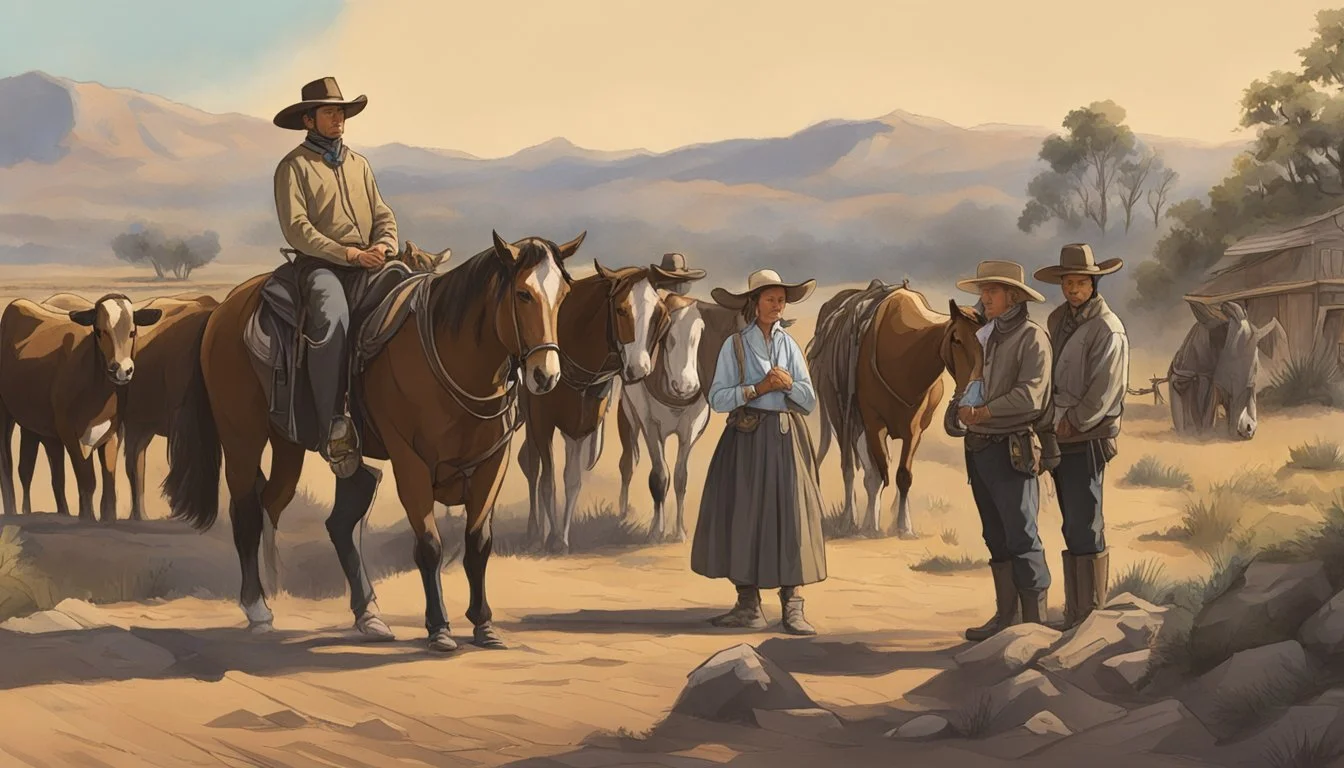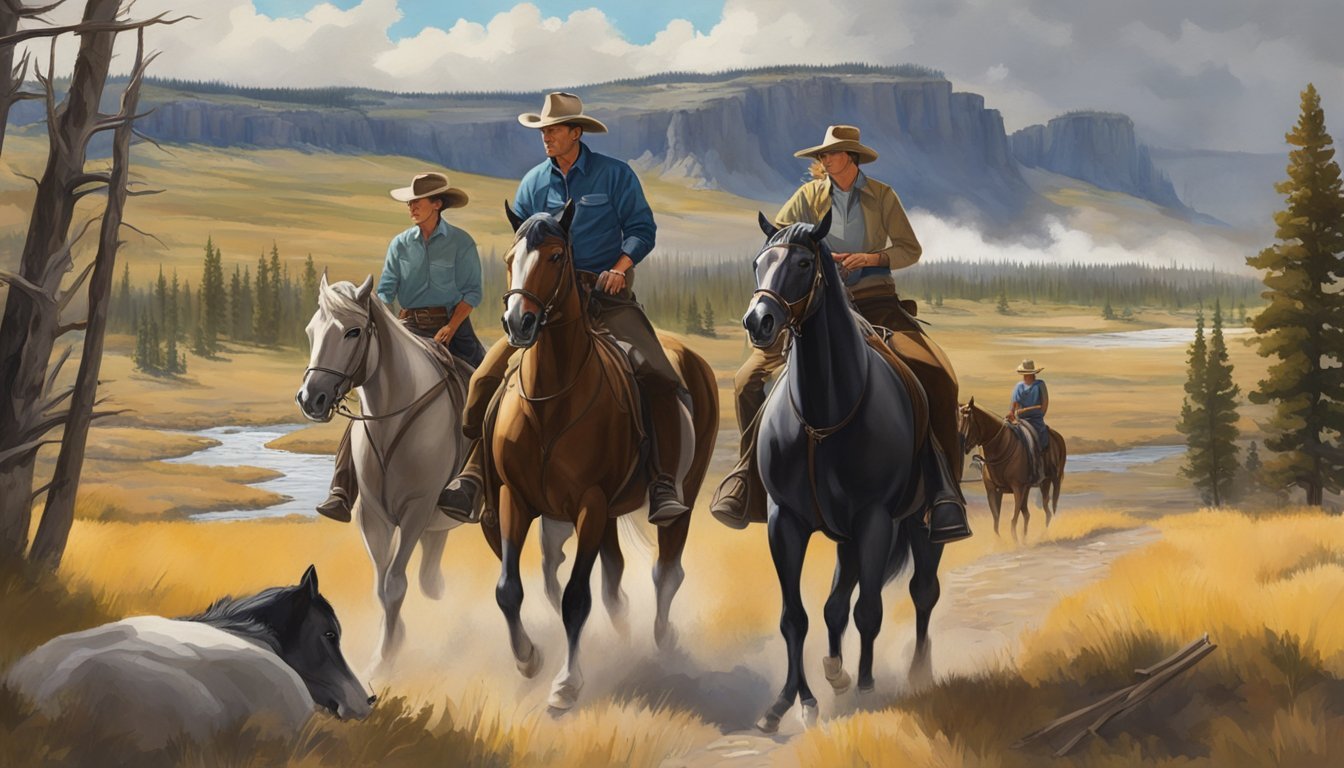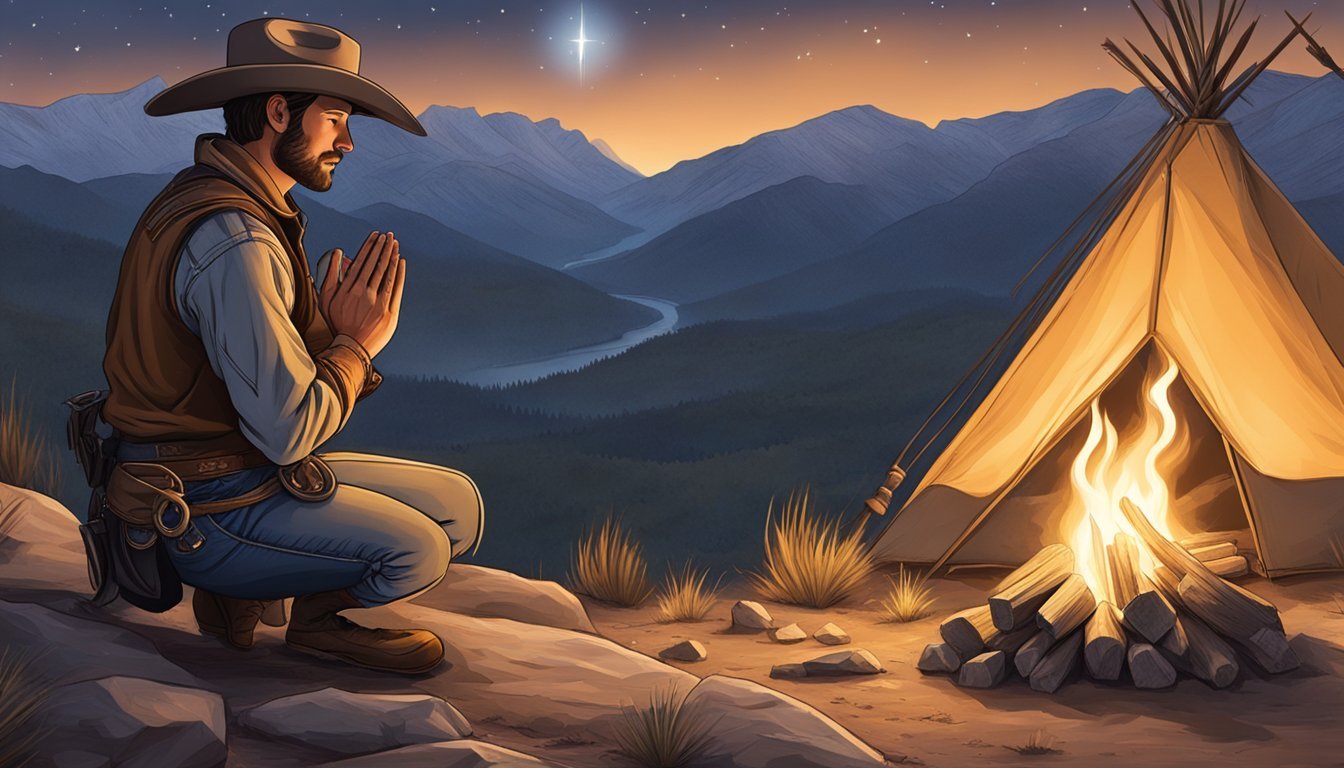Faith and Fury: How Religion Shapes the Duttons' Destiny in Yellowstone
The hit TV series Yellowstone explores the complex dynamics of the Dutton family as they fight to protect their vast Montana ranch. Set against the backdrop of the modern American frontier, the show delves into themes of power, loyalty, and tradition. Religion plays a subtle yet significant role in shaping the characters' worldviews and decisions.
While the Duttons' specific religious affiliation is not explicitly stated, Christian influences are evident throughout the series. Their faith informs their moral compass and provides a framework for understanding their place in the world. The show's creators use religious themes to add depth to the characters and highlight the spiritual aspects of life on the frontier.
Yellowstone's portrayal of faith reflects the complex relationship between religion and the American West. The series touches on topics like religious extremism and the role of spirituality in navigating life's challenges. By exploring these themes, Yellowstone offers viewers a nuanced look at how faith continues to shape the modern frontier experience.
Historical Context of Faith in the American West
Religion played a pivotal role in shaping the cultural and social landscape of the American West during the 19th century. Faith influenced migration patterns, interactions with Native American tribes, and the justification for territorial expansion.
Westward Expansion and Religious Motivations
The Oregon Trail served as a conduit for thousands of settlers seeking new opportunities in the West. Many were motivated by religious convictions, viewing the journey as a spiritual calling. Protestant denominations established missions along the trail, providing support to travelers.
Mormons embarked on their exodus to Utah, seeking religious freedom and the establishment of their own community. Their migration significantly impacted the settlement of the western territories.
Catholic missionaries also ventured westward, establishing schools and hospitals in frontier towns. These institutions played a crucial role in the development of early western communities.
Manifest Destiny and Religious Undertones
The concept of Manifest Destiny, which fueled westward expansion, had strong religious undertones. Many Americans believed it was their divine right and duty to spread across the continent.
This ideology often justified the displacement of Native American tribes and the acquisition of new territories. Religious leaders frequently invoked biblical imagery to support the idea of a promised land in the West.
The California Gold Rush of 1849 drew thousands westward, with some viewing the pursuit of wealth as a form of divine providence. Churches quickly established themselves in mining towns to serve the spiritual needs of prospectors.
Native American Tribes and Spiritual Beliefs
Native American tribes across the West had diverse and complex spiritual beliefs deeply tied to the land. These belief systems often clashed with the Christian faiths of incoming settlers.
Some tribes incorporated elements of Christianity into their traditional practices, creating syncretic belief systems. Others resisted attempts at conversion, viewing it as a threat to their cultural identity.
The U.S. government's policies of forced assimilation included efforts to suppress Native American spiritual practices. Christian missionaries played a controversial role in these efforts, establishing boarding schools aimed at "civilizing" Native American children.
Religion and Survival on the Frontier
Faith played a crucial role in the lives of pioneers settling the American West. It provided strength and guidance amid harsh conditions, while also intersecting with the violence inherent in frontier expansion.
Faith as a Pillar of Pioneer Life
Pioneers relied heavily on their religious beliefs to endure the challenges of frontier life. Daily prayer and Bible reading offered comfort and hope in the face of uncertainty. Many settlers formed tight-knit religious communities, holding services in homes or simple churches. These gatherings provided social support and a sense of normalcy.
Spiritual practices helped pioneers cope with isolation, disease, and natural disasters. Hymn singing lifted spirits during long wagon train journeys. Some viewed westward expansion as a divine calling, believing God had destined them to settle new lands.
Faith also influenced how settlers interacted with indigenous peoples and the environment. Many saw their work cultivating the land as fulfilling a sacred duty.
Spirituality vs. Violence in Settler Narratives
The frontier era was marked by conflict between settlers and Native Americans. This violence often clashed with religious ideals of peace and compassion. Some pioneers struggled to reconcile their faith with the brutal realities of territorial expansion.
Missionary efforts aimed to convert indigenous people, sometimes peacefully but often forcefully. These actions were driven by a mix of religious zeal and cultural superiority. Settler narratives frequently portrayed violent encounters as a battle between good and evil.
Religious beliefs sometimes justified aggressive expansion. The concept of Manifest Destiny framed westward movement as God's will. This mindset allowed some settlers to view violence against Native Americans as divinely sanctioned.
Faith and the Dutton Family Dynamics
Religion shapes the Dutton family's identity and influences their relationships. It provides a source of strength during challenging times while also creating internal conflicts.
Religious Beliefs and Family Identity
The Duttons adhere to Christian traditions, as evidenced by their participation in religious ceremonies. John Dutton, the family patriarch, upholds these beliefs as part of their heritage. The family's faith is closely tied to their connection with the land and their sense of duty to preserve it.
Beth Dutton, despite her rebellious nature, shows glimpses of spiritual reflection in times of crisis. Her complex relationship with faith mirrors the family's broader struggles to reconcile their beliefs with the harsh realities of their world.
Religious rituals, such as funerals, serve as important moments for the Duttons to come together and reaffirm their shared values. These events highlight the role of faith in maintaining family unity amid conflicts.
Spiritual Challenges and Personal Growth
The Duttons face numerous moral dilemmas that test their faith and values. John Dutton often grapples with decisions that pit his religious principles against the ruthless tactics needed to protect his land and legacy.
James Dutton, the family's ancestor, relied on his faith during the perilous journey westward. His experiences set a precedent for future generations, demonstrating how spirituality can provide guidance in the face of adversity.
The harsh realities of ranch life and business conflicts frequently challenge the Duttons' religious convictions. This tension leads to personal growth as family members question and redefine their beliefs.
Beth's journey of self-discovery involves confronting her past traumas through a lens of faith, albeit in her own unconventional way. Her struggles reflect the family's broader effort to find meaning and purpose in a world that often seems at odds with their spiritual ideals.
The Influence of Religion on Land and Power
Religious beliefs shape attitudes toward land ownership and use of natural resources in Yellowstone. These spiritual perspectives impact conflicts over territory and environmental stewardship.
Christian Ethics and Land Stewardship
The Dutton family's approach to managing the Yellowstone Dutton Ranch reflects Christian principles of stewardship. John Dutton views the land as a God-given responsibility, not just a possession. This mindset drives his fierce protection of the ranch against developers and activists.
Christian ethics also influence debates over water rights and conservation. Some ranchers cite biblical passages on mankind's dominion over nature to justify resource use. Others emphasize stewardship and preservation of God's creation.
These religious views clash with secular environmentalist perspectives. Tensions arise between faith-based and scientific approaches to land management.
Religion in Land Rights Disputes
Religious arguments surface in conflicts over Indigenous land claims near Yellowstone. Some cite Manifest Destiny and divine providence to defend current property boundaries. Native American spiritual connections to ancestral lands fuel opposing claims.
Local churches sometimes mediate disputes between ranchers and developers. Religious leaders appeal to shared values of community and tradition.
Faith-based environmental groups invoke religious duty to protect nature. They challenge purely profit-driven development on spiritual grounds. This adds a moral dimension to legal and economic debates over land use.
Religious Representation in 'Yellowstone'
'Yellowstone' explores faith and spirituality through its characters and narrative elements. The show presents a nuanced portrayal of religion in the modern American West.
Character Development and Faith
John Dutton, portrayed by Kevin Costner, embodies a complex relationship with faith. His actions often reflect a moral code rooted in traditional values, though he rarely discusses religion openly. Beth Dutton's character arc involves moments of spiritual questioning, particularly in times of crisis. Rip Wheeler's stoic nature occasionally gives way to contemplative scenes that hint at deeper spiritual beliefs.
The Native American characters, such as Chief Thomas Rainwater, bring a different spiritual perspective to the show. Their traditional beliefs often contrast with the predominantly Christian worldview of the white characters.
Narrative Structure and Religious Symbolism
Taylor Sheridan weaves religious themes into the narrative structure of 'Yellowstone'. The ranch itself serves as a symbolic Eden, constantly under threat from outside forces. Biblical allusions appear in character names and plot points, adding depth to the storytelling.
The show's depiction of religious practices is subtle but impactful. Church scenes and funeral rites punctuate key moments in the series, highlighting the role of faith in the characters' lives. These elements contribute to the authenticity of the modern Western setting that Paramount Network has crafted.
Religion, Culture, and the Modern American West
Religion continues to shape cultural identity and social dynamics in the contemporary American West. Faith intersects with evolving values and lifestyles, creating both harmony and tension.
Cultural Clashes and the Role of Faith
In Montana and surrounding states, traditional religious practices often collide with modern secular influences. Rural communities tend to maintain stronger ties to organized religion, while urban areas embrace more diverse spiritual expressions.
This divide fuels debates over issues like public prayer, religious education, and land use. Some ranchers view their stewardship of the land as a sacred duty. Others prioritize economic development over environmental concerns.
Churches remain important community hubs in many small towns. They provide social services and preserve cultural heritage. However, declining attendance poses challenges for some congregations.
Modern Interpretations of Frontier Religion
Today's Western faiths blend pioneer traditions with contemporary elements. Some megachurches incorporate country music and cowboy imagery into services. Native American spirituality has gained wider acceptance and practice.
Televangelists and online ministries reach isolated believers. Social media allows for new forms of religious community and expression. Interfaith dialogue has increased, fostering greater religious tolerance.
Freedom of religion remains a core Western value. However, its interpretation varies. Debates continue over the separation of church and state in schools and government. Religious diversity grows as new immigrant communities settle in the region.
Legacy and Continuity of Religious Themes
Religious themes in Yellowstone echo through time, shaping contemporary narratives and spiritual perspectives. The show's exploration of faith on the modern frontier resonates with viewers, bridging past and present.
Influence of Religious Narratives Today
Yellowstone's portrayal of religious beliefs continues to impact modern storytelling in the Western genre. The show's depiction of faith as a source of strength and guidance mirrors themes explored in predecessors like "1883" and "1923."
These narratives highlight how spiritual convictions help characters navigate moral dilemmas and harsh realities. The Dutton family's adherence to traditional values, often rooted in religious upbringing, showcases the enduring influence of faith in shaping decisions and relationships.
Modern Westerns like Yellowstone demonstrate how religious themes remain relevant, adapting to contemporary contexts while maintaining core spiritual elements.
Yellowstone's Impact on Contemporary Spirituality
Yellowstone's exploration of spirituality transcends the screen, influencing viewers' perceptions of faith in today's world. The show presents a nuanced view of religion, acknowledging both its comforting and challenging aspects.
Characters grapple with questions of morality, purpose, and legacy, often turning to their spiritual beliefs for answers. This portrayal resonates with audiences, prompting reflection on their own spiritual journeys and the role of faith in modern life.
Yellowstone's depiction of Native American spirituality also broadens viewers' understanding of diverse religious practices, fostering greater appreciation for indigenous beliefs and traditions.




